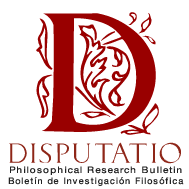Paulo Vélez León
Universidad Técnica Particular de Loja, Ecuador | pevelez@utpl.edu.ec
Received: 15-October-2019 | Accepted: 21-December-2019 | Published: 28-December-2019
Disputatio [Dec. 2019], Vol. 8, No. 11, pp. 495–503 | DOI: 10.5281/zenodo.3594562
Article | [SP] | Full Text | Statistics | Copyright Notice [sp] | Vol. 8 No. 11
How to cite this article:
Vélez León, Paulo (2019). «Medioevo y Renacimiento: anotaciones sobre el espíritu humanista de recuperación y transmisión del saber antiguo». Disputatio. Philosophical Research Bulletin 8, no. 11: pp. 495–503.
Abstract | The Medieval and Renaissance intellectual movements aiming at the recovery and transmission of knowledge are what is mainly responsible for handing down to our times the acquaintance with the science, medicine, philosophy and literature of the classical Greco-Roman world; and adequate comprehension, however, of what these periods mean and the work achieved by these movements are still tasks for us to complete. Given this background, I shall argue in this paper that there are, evidently, differences between these two periods, though they are not as profound as commonly believed. To show this, I shall then proffer some considerations about similarities and differences between the Middle Ages and the Renaissance. Finally, having established this as a conceptual framework, I shall suggest that the notion of Humanistic Spirit may help us to comprehend these periods and intellectual movements.
Keywords | Knowledge · Translation · Humanism · Ancient Knowledge · Aristotle · History of Science.
![]()
Medioevo y Renacimiento: anotaciones sobre el espíritu humanista de recuperación y transmisión del saber antiguo
Resumen | Los movimientos intelectuales medioevales y renacentistas de recuperación y transmisión del saber han legado a nuestra época, en buena medida, el conocimiento de la ciencia, medicina, filosofía y literatura del mundo clásico grecolatino; no obstante, una adecuada comprensión de lo que significan estos períodos y la labor de estos movimientos sigue siendo una asignatura pendiente para nosotros. En este sentido, en este trabajo, argumentaré que entre estos dos periodos hay diferencias evidentes, aunque no son tan profundas como a veces comúnmente se cree. Así, primero presentaré algunas consideraciones sobre las semejanzas y diferencias entre la Edad Media y el Renacimiento, y luego sugeriré que la noción de espíritu humanista puede ayudarnos a comprender dichos movimientos intelectuales.
Palabras clave | Conocimiento · Traducción · Humanismo · Saber Antiguo · Aristóteles · Historia de la Ciencia.
References
Colomer, Eusebi (2011). De la Edad Media al Renacimiento. Ramón Llull, Nicolás de Cusa, Juan Pico della Mirandola. 2da. Edición. Barcelona: Herder, 2012.
Copenhaver, Brian P. y Schmitt, Charles B. (1992). Renaissance Philosophy. Oxford: Oxford University Press.
Garin, Eugenio (1954). Medioevo e Rinascimento. Studi e ricerche. Bari: Laterza. [Trad. cast.: Medioevo y Renacimiento. Estudios e investigaciones. Trad. Ricardo Pochtar. Madrid: Taurus, 2001].
Mann, Nicholas (1996). «The origins of humanism». En: The Cambridge Companion to Renaissance Humanism, editado por Jill Kraye. Cambridge: Cambridge University Press.
Menéndez Pelayo, Marcelino (1889). «De las vicisitudes de la filosofía platónica en España». Discurso leído en la Universidad Central en la solemne inauguración del curso académico de 1889 a 1890. Madrid.
Solís, Carlos y Sellés, Manuel (2005). Historia de la Ciencia. 4ta. Edición. Barcelona: Espasa, 2013.
Vélez León, Paulo (2014). «Consideraciones historiográficas para una historia de la ontología». En: XX Congrés Valencià de Filosofia, editado por T. Grimaltos, P. Rychter, & P. Aguayo. València: Societat de Filosofia del País Valencià, pp. 347–362.
Vélez León, Paulo (2017a). «τὸ ὂν ᾗ ὂν. Sobre el significado de la ontología. De la “filosofía primera” de Aristóteles a la “metaphysica” de Domingo Gundisalvo». Universidad de Salamanca.
Vélez León, Paulo (2017b). «Sobre la noción, significado e importancia de la Escuela de Toledo». Disputatio. Philosophical Research Bulletin 6, no. 7: pp. 537-579..
© The author(s) 2019. This work, published by Disputatio [www.disputatio.eu], is an Open Access article distributed under the terms of the Creative Commons License [BY–NC–ND]. The copy, distribution and public communication of this work will be according to the copyright notice. For inquiries and permissions, please email: boletin@disputatio.eu.

